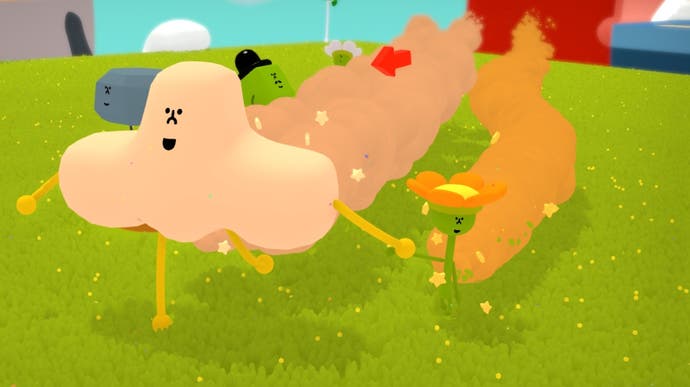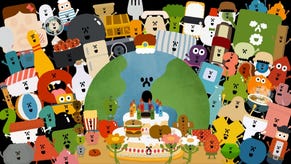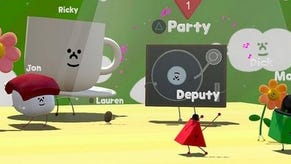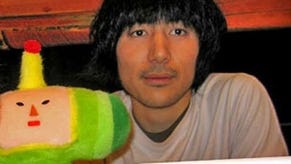PlayDate, lethal playgrounds and goat boobs: the eccentricity of Keita Takahashi
A playdate with the mastermind behind Katamari Damacy.
Keita Takahashi is one of a kind. First making his mark on the video game world with Katamari Damacy, he's been a sporadic but welcome presence in the industry ever since, creating Noby Noby Boy in 2009 and working on various projects - such as the ambitious, sadly cancelled MMO Glitch and the show-floor favourite Tenya Wanya Teens - since. Over the next 12 months we're due not just one but two Takahashi games, first with Wattam for PC and PS4 and, early next year, with his contribution to the recently announced handheld PlayDate. We took the chance to sit down with him at BitSummit last week to talk about… Well, various things.
Let's start with Wattam, I guess. What's taken so long! It's been in development for so long now.
Keita Takahashi: Yeah, it's been five or six years. You can play the demo now though! Why? There are many reasons, but the biggest reason is we got cancelled by Sony. But we still believed it'd be a good game, so at the time one of the ex-Santa Monica Studio guys, he told me they were looking for a new partner, a new publisher - which is Annapurna - so I was waiting on that. While I was waiting, I was able to make different games, like the Google AR project, currently the Panic Playdate thing. And then, finally we got investment from Annapurna Interactive, we had to find new team members, update the game engine. That's why it's taken so long.
Why did Sony cancel it - do you know their reasons?
Keita Takahashi: I don't know - actually, I don't care! [Laughs].
[A quick sidenote - despite the cancellation, there's certainly no bad blood between Takahashi and Sony - at BitSummit he was part of the keynote alongside Sony's Shuhei Yoshida, and Wattam was one of the star attractions on the PlayStation stand. It is, like so much in games, just one of those things].
Maybe they didn't understand what Wattam is. It's hard to describe - even I can't really do it.
So... Now I'm going to ask you how you'd describe it.
Keita Takahashi: If I could describe it in language, why do I have to make a video game, right? [Laughs]
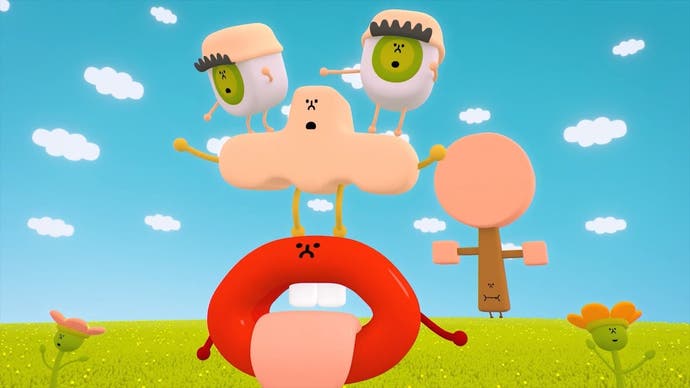
On a base level, then, what are you trying to express?
Keita Takahashi: I lived in Vancouver before I moved to San Francisco. When I was living in Vancouver, I got the very basic idea for Wattam. Before I moved to Vancouver, I was living in Tokyo. In Tokyo there's some diversity, but more people are Japanese, talk Japanese - people are the same. I know that's extreme talk! But in Vancouver, there are so many different races of people - Chinese, African, European, Canadian - they talk English to work together, even though they have their own mother language. We still have some dumb issues in our world, there are so many fights, so much friction, that's also made with the differences - different regions, companies, countries and so on. But I'd say if all people, the same kind of people, the same kind of culture, that's going to be super boring.
Yeah, I live in south London and it's why I love it and never want to leave.
Keita Takahashi: Human beings are so different, and they're living on the same planet. I just wanted to make a video game where so many different people work together to get over the differences, make something new, it's such fun. That's the original idea of Wattam.
You just described it really well!
Keita Takahashi: That's just the concept! That's not describing the game.
Yeah, but the concept's the important bit. Everything else is just detail.
Keita Takahashi: Okay! So that's Wattam!
How much has it changed over the years?
Keita Takahashi: There's not so much change, but we had to cut some fundamental things. They're kind of small things, but for me that's really big. Have you played it yet?
I haven't - I know it's on the showfloor, and I know I shouldn't be like this in my line of work, but if it's something I really want to play I want to wait until the final thing is in my hands.
Keita Takahashi: Okay. That's good! One of the core mechanics, you can control everyone - that includes the ground. [Laughs]. In Wattam, there are three different size of people - small, medium and large. The large size, that's kind of country size. The original idea was all different size of people would be controllable, then the camera can zoom out freely - when you're small people you can zoom out, then you can be the country, the ground, then you zoom in.
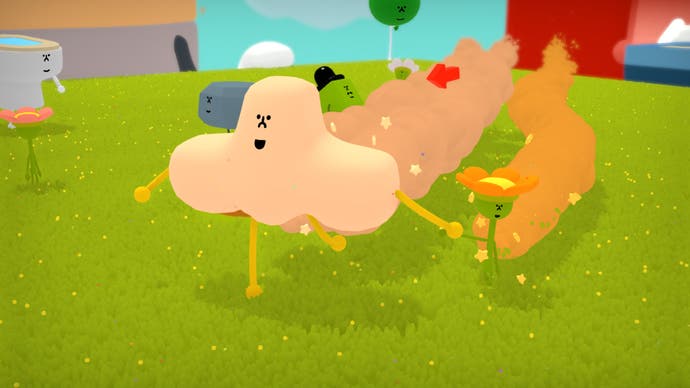
That sounds difficult.
Keita Takahashi: Yeah, so we decided that the world would not be moveable. And that was one of the biggest, main ideas that got cut for the schedule. We just need five more years.
I was going to ask more specifically about the release date actually - so that makes it something like 2024, right?
Keita Takahashi: [Laughs] Yeah! And also while people were standing on the sphere, not the flat ground, they move around like Mario Galaxy - that made things so much more complicated. That's super complicated. The game, it's not like that. It's very simple. But the system is very complicated.
Are you happy with where it is now, then - does it communicate what you want it to?
Keita Takahashi: Yeah! That's great. But then people don't know how to pronounce the name of Wattam...
What does Wattam even mean?
Keita Takahashi: I made the Wattam prototype with an Indian game engineer - his language was Tamil. Va??am means circle - and in Japanese 'wa' means circle, so I just combined them, because it's a game about connecting people. Like Death Stranding!
Are you going to be out before or after Death Stranding?
Keita Takahashi: I wish we could release the same day! [Laughs]
You're working with PlayDate on its new handheld as well - how's that going?
Keita Takahashi: I was designing that while I got the cancellation from Sony, like two or three years ago. Do you want to see the device?
I really, really do.
[Takahashi pulls a prototype out of his bag which I tinker with for a few minutes. I'll spare you my oohs and aahs, but a quick note on the PlayDate - it's a gorgeous thing, even if it's prone to crashing. The crank offers just the right amount of resistance, the yellow is dazzling and it feels sturdy in the hand - indeed, the production values of the thing, even at this prototype stage, are remarkable, with the black and white screen beautifully crisp. It's kind of like a Tim Hunkin device that's been brought to mass production, and Takahashi's own game for it feels like something you'd play in one of Hunkin's arcades - a cute, playful spin on a real-life situation as you furiously wind the crank in order to make a date in time].
What's your relationship with games at the moment - are you playing much yourself?
Keita Takahashi: I don't play any video games.
Why not?
Keita Takahashi: Beside my kids - I just play what they want.
Do they play your games?
Keita Takahashi: I have Katamari Re-rolled!
I saw that Bandai Namco recently gave the prince a gun. That was odd.
Keita Takahashi: That was a surprise! They didn't have any sense of the Katamari concept, or what the Katamari fans like. They just used the prince's head for another game. For money? I don't know.
Is that annoying when you see Katamari being used like that? Or have you moved on?
Keita Takahashi: That's a business - video games are a business. I understand - I just don't like it! [Laughs] I'm glad I quit Namco.
You always seem kind of far removed the video game industry.
Keita Takahashi: [Laughs]
No, that's a good thing!
Keita Takahashi: I don't feel like I'm part of any video game industry.
The outsider thing is great, though. It means you're not repeating everyone's mistakes. You get to make your own mistakes!
Keita Takahashi: Yeah, of course! I'm so stupid! I wish I could learn from my past.
Where do you see yourself? Are you an artist - or you just do what you do?
Keita Takahashi: I don't know! That's my personality issue. I don't like crowds, I don't like parties, I don't like networking. I'm just kind of in my mind.
I bet you hate interviews as well. Sorry.
Keita Takahashi: That's fine! That's my punishment.
Oh god! It's not that bad is it?
Keita Takahashi: Yeah! No, I mean, okay - I could make video games, that's a good thing. I *have* to get the punishment for things to be even.
What is it you like about video games - what is it that made you choose them to express yourselves over anything else?
Keita Takahashi: So, that's going to be a bit of a long story.
I'm fine with a long story.
Keita Takahashi: I was playing video games when I was a kid - at elementary school, middle school - then I went to art college to study sculpture. I like to make these things - objects, paintings, whatever - but especially sculpture, it's kind of wasteful. If you don't like it, you have to throw it away in the trash. And that's going to be big trash! Also it's useless. That was my complex. I like to make things, but sculpture, that's just trash if it's not great. So I thought maybe I should just make a tool that you could use easily in your life - like a glass, a cup, a chair, a table. But that's not fun.
So I tried to make a flower pot, but shaped like a goat. You could put the flower on the back of the goat, drain the water out and it drains through the goat's boobs.
Yup, that makes sense.
Keita Takahashi: It makes sense, right? I did the presentation to other students, and they were laughing. So that's the moment I discovered what I wanted to do. This is what I can do - make something funny, that makes people smile, and maybe something useful too.
All those things you described - the cup, the glass, the flower pot - they all have a purpose, a function. So what's the function of your video games?
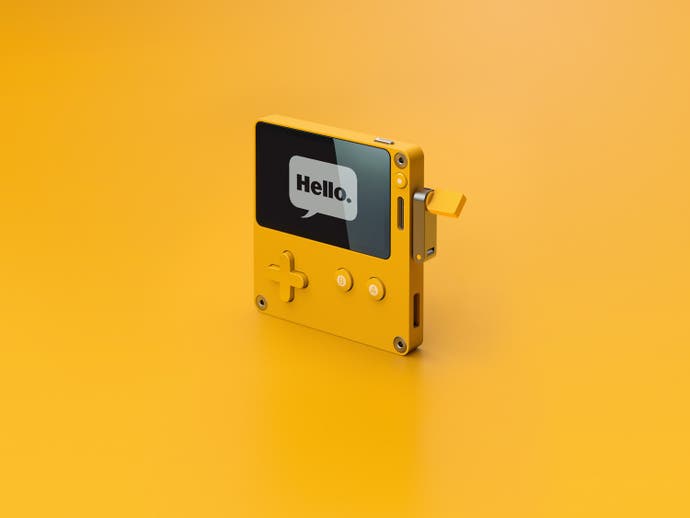
Keita Takahashi: Well, then I was thinking after graduating what can I do? I didn't want to be an artist - art, that's useless, an unnecessary job. At the same time, I wanted to make people smile, to make them happy. I just remembered when I was playing video games when I was a kid, they make people smile. And also it's a worldwide business. If I was able to be a sculptor, make an object, other people from other countries come to Japan to see my object - but a video game, you can get anywhere. That's a great thing. I thought 'video games, there's no more trash bin'! If I make a 3D object, there's plastic and metal - with video games, you just need electricity and a monitor. It's so clean!
So video games as environmentally friendly art?
Keita Takahashi: Yeah! But that was not true. It's more messy! I needed more elements than electricity and power that weren't good for the environment. Anyway, I decided to give my life to making more fun things rather than functional.
Is it difficult to convince people to make what you want to make? When you were working at Bandai Namco, it must have been difficult to convince people to make something like Katamari as it was so different.
Keita Takahashi: The lucky thing is, my boss, he's also strange people. Actually, I failed the interview at Namco, the executive interview. The executives, they didn't like me. But the artist boss, he liked me - he told the executive that I'd be great, I could make something new, so the executive changed their mind.
Is your secret to surround yourself with strange people?
Keita Takahashi: Yes! I'm so lucky.
Are video games still your life's work? Will you carry on with them after Wattam?
Keita Takahashi: I'm not a genius. Making video games is all I can do, but I still want to try and make a playground.
Like the one that was planned in Nottingham?
Keita Takahashi: Yeah, that was cancelled. Making a playground, that's kind of my dream. A playground, it's kind of useless, right? But also very functional.
The problem is they're not universal - unless you make lots of playgrounds. You could make one piece of apparatus - something like a swing - that could then be installed in all the playgrounds around the world. That'd be easier.
Keita Takahashi: I see - okay. Maybe I should make a company for playground equipment.
Is it still something you're pursuing?
Keita Takahashi: Right now, no. But yes, I want to be back and designing a playground if it's possible.
What ideas do you have for the playground?
Keita Takahashi: So my idea is very simple - taking some existing equipment, like a swing, a slide, and you just extend them. And that makes it more fun! And dangerous.
There was a slide that opened recently [in the Costa del Sol] and it was really dangerous, it went down the middle of a town. I think they were going to ban it as it was dangerous, but they kept it open anyway.
Keita Takahashi: Nice.
So just a big slide is your idea?
Keita Takahashi: My design, one of the candidates for the playground in Nottingham, it had this big steep, and I was planning on putting a donut-shaped half-pipe so you could come down and then up in this circle. Maybe sometimes other people slide down from the other side.
[At this point, a BitSummit staff member comes in and I'm told that Takahashi's next appointment is waiting]
Oh. You have to leave. [Laughs]. You have to leave! I'm sorry....
Wattam is due out on PS4 and PC at some point in 2019
